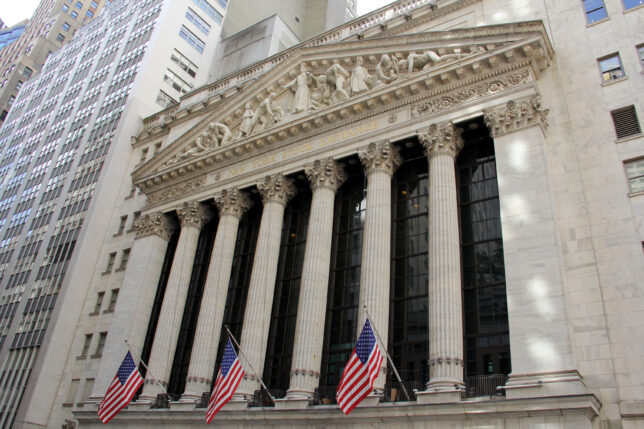Organization Trends
To Understand ESG Activism, Look to Shareholder Resolutions
 New York Stock Exchange. Credit: ARK NEYMAN. License: Shutterstock.
New York Stock Exchange. Credit: ARK NEYMAN. License: Shutterstock.

For those wondering how and why environmental, social, and corporate governance (ESG) became a ubiquitous feature of American corporate culture seemingly overnight, you’re not alone. Congress wants to know, too.
The House Financial Services Committee recently held a series of hearings on the issue, as part of what Republicans have been calling “ESG month.” Congressional attention has been driven by ESG’s increasing prominence as a political issue, and concerns range from its impact on ordinary investors to the way in which it shoehorns substantive public policy debates into the private corporate sector.
Shareholder resolutions filed by ESG investor-activists are a major driver of that second concern, and an examination of those resolutions leads to four broad observations regarding this particular form of ESG activism.
First, the number of ESG shareholder resolutions has been growing over the past several years. Second, those resolutions are making ever-increasing demands of companies. Third, those demands are often rooted in sociopolitical objectives more typically associated with politics and issue-advocacy groups than with corporations and shareholders. Finally, those who file ESG shareholder resolutions have traditionally leaned lopsidedly to the ideological left.
Georgeson, a firm that specializes in the issue, has calculated that the number of ESG shareholder proposals filed at Russell 3000 companies has been increasing for four straight years, up from 754 in the 2020 proxy season to at least 951 in the 2023 season. The Proxy Preview, a pro-ESG annual report published by the 501(c)(3) nonprofit As You Sow, cataloged a similar jump from 429 to 542 resolutions over that same period. As You Sow is itself among the most prominent ESG shareholder activist groups in the country, and its website lists over 680 proposals on which it has “represent[ed] investors” since 2010—more than half of which were filed in just the last four years. A full 15 percent involved just seven companies, many of them household names: ExxonMobil, Chevron, Kroger, McDonald’s, Amazon, Ameren, and Southern Company.
The trajectory of As You Sow’s past engagements with Bank of America illustrates well how ESG activists have accelerated their substantive demands in recent years. In 2011 and 2012, As You Sow was simply trying to persuade Bank of America to stop using a particular chemical in its receipt paper. In 2020, it got more aggressive, submitting a resolution asking the bank to report on “risks associated with maintaining its current levels of carbon-intensive lending.” The 2021 resolution was even more explicit, asking “if and how [Bank of America] intends to reduce the [greenhouse gas] emissions associated with its financing activities” to align with the Paris Agreement and net-zero emissions. This year, As You Sow asked the bank for a detailed “transition plan” explaining “how [Bank of America] intends to align its financing activities with its 2030 sectoral greenhouse gas emissions reduction targets,” including the specific actions it would take, the reductions purportedly to be achieved, and applicable timelines. That resolution secured 28.5% of the shareholder vote.
ESG resolutions track some of the most controversial issues in the American socio-political landcape. The 2020 Black Lives Matter protests prompted a series of resolutions in 2021 and 2022 asking companies to commission third-party racial justice/equity audits of themselves. The Supreme Court’s 2022 decision in Dobbs v. Jackson Women’s Health Organization led to a slew of new resolutions on abortion in 2023.
Left-of-center funding heavyweights are involved in ESG, too. Since 2020, As You Sow has received at least $1.7 million from the Open Society Foundations and the Foundation to Promote Open Society—a pair of giant philanthropies established by liberal billionaire George Soros. Another 501(c)(3) nonprofit called Ceres—whose 220-member investor network has been credited in recent Proxy Previews with coordinating most of the climate change resolutions profiled in those reports—received almost $7.3 million from the Arabella Advisors-managed New Venture Fund from 2017 to 2021.
The core objective for ESG activists is to achieve through the private corporate sector what they have been unable to achieve through the traditional democratic political process. Shareholder resolutions are one manifestation of this campaign, and they help explain the leftward shift on political and cultural issues that certainly appears to be taking place across corporate America. The good news for those who are concerned about this trend—as evidenced by the hearings—is that as awareness of ESG activism has grown, so has the pushback against it. Indeed, this resistance is itself largely a product of just how far ESG activists have pushed things in recent years.
To learn more, please see the Capital Research Center’s full four-part series on “Progressive” ESG Shareholder Activism.
This article originally appeared in RealClearMarkets on July 26, 2023.


